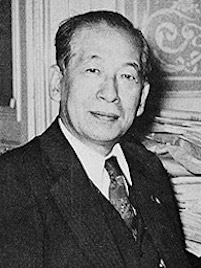Tokujirō Kanamori on:
[Wikipedia]
[Google]
[Amazon]
 was a
was a
 was a
was a Japanese
Japanese may refer to:
* Something from or related to Japan, an island country in East Asia
* Japanese language, spoken mainly in Japan
* Japanese people, the ethnic group that identifies with Japan through ancestry or culture
** Japanese diaspor ...
politician. He was a major figure in the implementation of the postwar Japanese Constitution
The Constitution of Japan is the supreme law of Japan. Written primarily by American civilian officials during the occupation of Japan after World War II, it was adopted on 3 November 1946 and came into effect on 3 May 1947, succeeding the Mei ...
.
Kanamori was born in 1886 in Aichi Prefecture
is a Prefectures of Japan, prefecture of Japan located in the Chūbu region of Honshū. Aichi Prefecture has a population of 7,461,111 () and a geographic area of with a population density of . Aichi Prefecture borders Mie Prefecture to the ...
. He graduated from Tokyo University
The University of Tokyo (, abbreviated as in Japanese and UTokyo in English) is a public research university in Bunkyō, Tokyo, Japan. Founded in 1877 as the nation's first modern university by the merger of several pre-westernisation era ins ...
in 1912 with a degree in Law, and started work for the Ministry of Finance
A ministry of finance is a ministry or other government agency in charge of government finance, fiscal policy, and financial regulation. It is headed by a finance minister, an executive or cabinet position .
A ministry of finance's portfoli ...
. In 1924, he was appointed as Director of the new Cabinet Legislation Bureau (the first person to hold this post) and he subsequently became Director-General of the Bureau a decade later. He was, however, pressured into resigning only two years later, due to sympathies with the controversial "Emperor Organ" theory proposed by Tatsukichi Minobe
was a Japanese statesman and scholar of constitutional law. His interpretation of the role of the monarchy in the pre-war Empire of Japan was a source of considerable controversy in the increasingly radicalized political environment of Japan i ...
. Nevertheless, he remained a respected constitutional scholar, who had published several books on the Meiji Constitution
The Constitution of the Empire of Japan ( Kyūjitai: ; Shinjitai: , ), known informally as the Meiji Constitution (, ''Meiji Kenpō''), was the constitution of the Empire of Japan which was proclaimed on February 11, 1889, and remained in ...
. He was consulted on the wording of the new constitution by Toshio Irie.
His election to the House of Peers in 1946 marked the start of his return to politics. He was elected as Minister of State
Minister of state is a designation for a government minister, with varying meanings in different jurisdictions. In a number of European countries, the title is given as an honorific conferring a higher rank, often bestowed upon senior minister ...
in the first cabinet of Shigeru Yoshida
was a Japanese diplomat and politician who served as prime minister of Japan from 1946 to 1947 and again from 1948 to 1954, serving through most of the country's occupation after World War II. Yoshida played a major role in determining the cour ...
, and in this capacity argued forcefully in favour of the new postwar constitution. In the course of 114 days of debate, Kanamori responded to over a thousand questions, with extensive responses that took up to one and a half hours. After the implementation of the new legislation, Kanamori helped to form the ''Kenpō Fukyū Kai
The was a Japanese group founded in 1946 to promote the reformed Constitution of Japan.
After World War II, the Allied occupation required that the existing Meiji Constitution of Japan be amended to replace the absolute rule of the Emperor with ...
'' (Constitution Popularization Society) in December 1946, and published books and tracts to spread awareness of the new laws throughout the population.
In 1948 he became the first librarian of the National Diet Library
The is the national library of Japan and among the largest libraries in the world. It was established in 1948 for the purpose of assisting members of the in researching matters of public policy. The library is similar in purpose and scope to ...
, a post he held until his death in 1959.
References
{{DEFAULTSORT:Kanamori, Tokujiro Members of the House of Peers (Japan) 1886 births 1959 deaths Politicians from Aichi Prefecture University of Tokyo alumni